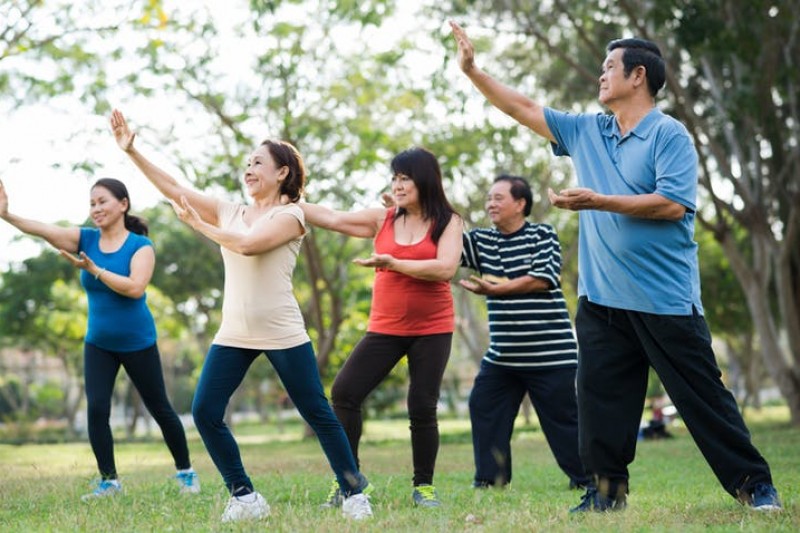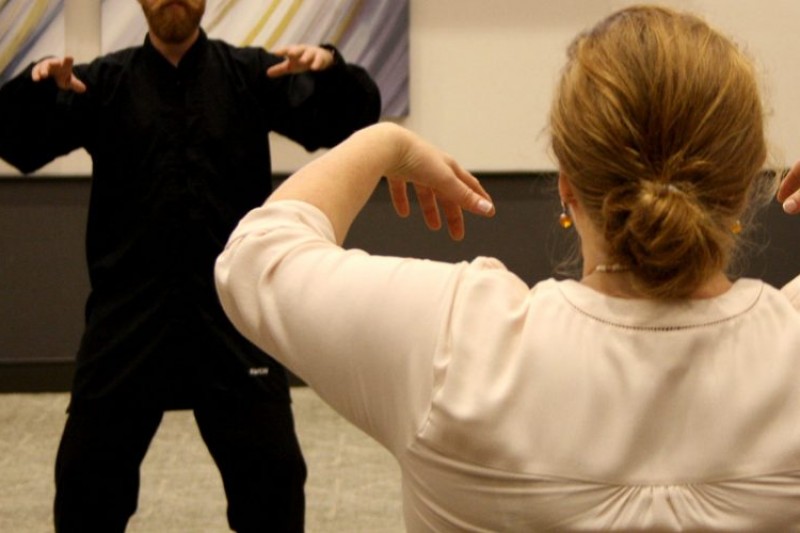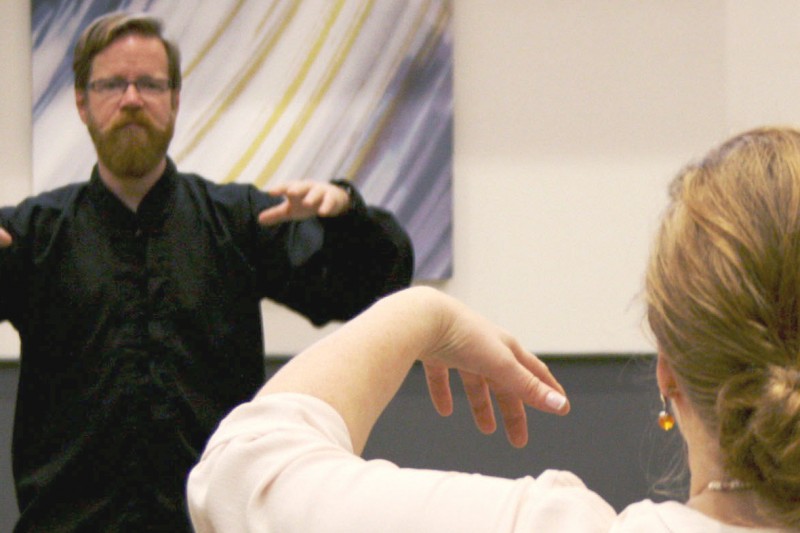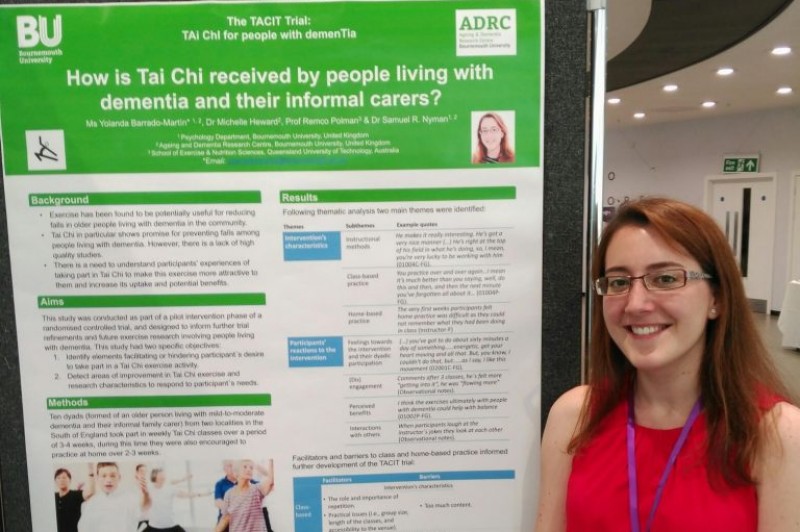The main trial outcome paper, led by chief investigator Dr Samuel Nyman:
Nyman, S. R., Ingram, W., Sanders, J., Thomas, P. W., Thomas, S., Vassallo, M., Raftery, J., Bibi, I., & Barrado-Martín, Y. (2019). Randomised controlled trial of the effect of Tai Chi on postural balance of people with dementia. Clinical Interventions in Aging, 14, 2017-2029. DOI: https://doi.org/10.2147/CIA.S228931.
The trial protocol, led by chief investigator Dr Samuel Nyman:
Nyman, S. R., Hayward, C., Ingram, W., Thomas, P., Thomas, S., Vassallo, M., Raftery, J., Allen, H., & Barrado-Martín, Y. (2018). A randomised controlled trial comparing the effectiveness of Tai Chi alongside usual care with usual care alone on the postural balance of community-dwelling people with dementia: Protocol for The TACIT Trial (TAiChI for people with dementia). BMC Geriatrics, 18, e263. DOI: https://doi.org/10.1186/s12877-018-0935-8.
The results of Yolanda Barrado-Martín’s PhD work on what helped / hindered participants from attending the Tai Chi classes:
Barrado-Martín, Y., Heward, M., Polman, R., & Nyman S. R. (2021). Adherence to the class-based component of a Tai Chi exercise intervention for people living with dementia and their informal carers. Journal of Aging and Physical Activity, 29 (5), 1-14.
The results of Yolanda Barrado-Martín’s PhD work on what helped / hindered participants from completing their home-based Tai Chi practice:
Barrado-Martín, Y., Heward, M., Polman, R., & Nyman S. R. (2021). People living with dementia and their family carers’ adherence to home-based Tai Chi practice. Dementia: The International Journal of Social Research and Practice, 20 (5), 1586-1603.
The findings from the pilot intervention phase, led by BU PhD student Yolanda Barrado-Martín:
Barrado-Martín, Y., Heward, M., Polman, R., & Nyman, S. R. (2018). Acceptability of a dyadic Tai Chi intervention for older people living with dementia and their informal carers. Journal of Aging and Physical Activity, 27 (2), 166-183.
The results from additional work, led by BU's Dr Michelle Heward, that evaluated how we recruited and retained volunteers in the trial:
Heward, M., Johnson, L., & Nyman, S. R. (2021). Evaluation of strategies to recruit and retain older people with dementia and their informal carers into a Tai Chi Trial to improve balance and prevent falls. Journal of Frailty, Sarcopenia and Falls, published online.
The results from additional work, led by BU's Natalia Adamczewska, exploring the best way to record falls experienced by people with dementia:
Adamczewska, N., Barrado-Martín, Y., Thomas, S., Thomas, P. W., Vassallo, M., & Nyman, S. R. (2019). Feasibility and accuracy of different methods for collecting data on falls among people with dementia. Alzheimer Disease & Associated Disorders, 34 (4), 362-365.
The results from additional work, led by chief investigator Dr Samuel Nyman, that tested the validity of using a short questionnaire on quality of life with people with dementia:
Nyman, S. R., Casey, C., & Polman, R. (2021). Psychometric properties of the ICECAP-O quality of life measurement tool when self-reported by community-dwelling older people with mild and moderate dementia. Alzheimer Disease & Associated Disorders. Published online 11 January. DOI: 10.1097/WAD.0000000000000430.
The results from additional work, led by BU's Dr Jonathan Williams, exploring whether Tai Chi could improve the subcomponents of the main dynamic balance test used:
Williams, J., & Nyman, S. R. (2021). A secondary analysis of a randomised controlled trial to investigate the effect of Tai Chi on the instrumented Timed Up and Go test in people with mild to moderate dementia. Aging Clinical and Experimental Research, 33 (8), 2175-2181.
The results from additional work, led by BU's Dr Jonathan Williams, exploring how people with dementia have poorer balance compared with those without dementia of similar age:
Williams, J., & Nyman, S. R. (2020). Age moderates differences in performance on the instrumented timed up and go test between people with dementia and their informal carers. Journal of Geriatric Physical Therapy, 44 (3), E150-E157.
The results from additional work, led by BU's Dr Jonathan Williams, exploring the relationships between cognitive function, fear of falling, and quality of life, with a digital measure of people with dementia's performance on our key balance task:
Williams, J.M. and Nyman, S.R. (2018) Association between the instrumented timed up and go test and cognitive function, fear of falling and quality of life in community dwelling people with dementia. Journal of Frailty, Sarcopenia and Falls, 3 (4), 185-193.
The results of additional work led by BU PhD student Iram Bibi that found a quality of scale is reliable for use with people with dementia:
Bibi, I., Polman, R., & Nyman, S. R. (2022). Reliability of the ICECAP-O quality of life scale with community dwelling people with dementia. Gerontology and Geriatric Medicine, 8, 1-4. DOI: https://doi.org/10.1177/23337214221086802.





